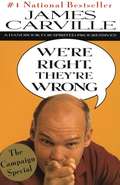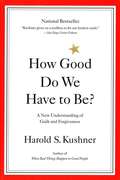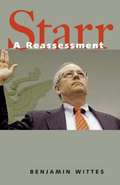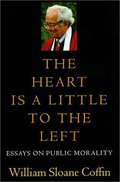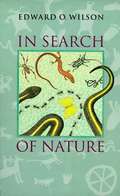- Table View
- List View
We're Right, They're Wrong: A Handbook for Spirited Progressives
by James Carville"They are wrong and we are right and I'm going to prove it to you!" -- Harry S. Truman, Democratic National Convention, 1948 A rousing political manifesto from "The New York Times" bestselling co-author of "All's Fair" One of Washington's most prominent Democratic strategists and co-author of the "New York Times" bestseller "All's Fair" offers a timely, accessible and entertaining response to the GOP's Contract with America -- just in time for primary season. With the Republican Congress blasting away at the federal government, James Carville, a top advisor to President Clinton, counterattacks. In "We're Right, They're Wrong," he uses his trademark mix of pointed argument, homespun wit, and historic lore to deflate GOP claims that nothing is amiss in America that budget-cutting wouldn't cure. Carville staunchly defends a strong government -- one capable of teaching, feeding, healing, defending and sheltering its citizens -- and provides Democrats and progressives with a politically astute program for building upon what's best about our nation. Filled with anecdotes and political myths, "We're Right, They're Wrong" is a succinct, witty, fact-filled trot.
The American Republic
by O. A. BrownsonFrom the author's preface: In the volume which, with much diffidence, is here offered to the public, I have given, as far as I have considered it worth giving, my whole thought in a connected form on the nature, necessity, extent, authority, origin, ground, and constitution of government, and the unity, nationality, constitution, tendencies, and destiny of the American Republic
Black Holes and Warped Spacetime
by William J. KaufmanYOU ARE NEARING A BLACK HOLE. — What was once a massive star, perhaps millions of times bigger than our own sun, has collapsed into oblivion...and is now a hole in the universe. As you fall at almost the speed of light toward the edge, time begins to slow down and soon will cease to exist. The hands on your clock will stop, and so will your heartbeat. Finally, with no possibility of ever turning back, you will disappear from this universe. Astrophysicist William J. Kaufman takes you across our turbulent cosmos to observe the most awesome phenomena ever predicted by modern science. The wonders you will discover--explained in terms you will understand--surpass even the wildest imaginings of science fiction.
Eyewitness to Power: The Essence of Leadership Nixon to Clinton
by David GergenFrom Nixon to Clinton, Watergate to Whitewater, few Americans have observed the ups and downs of presidential leadership more closely over the past thirty years than David Gergen. A White House adviser to four presidents, both Republican and Democrat, he offers a vivid, behind-the-scenes account of their struggles to exer- cise power and draws from them key lessons for leaders of the future. Gergen begins Eyewitness to Power with his reminiscence of being the thirty-year-old chief of the White House speechwriting team under Richard Nixon, a young man at the center of the Watergate storm. He analyzes what made Nixon strong-and then brought him crashing down: Why Nixon was the best global strategist among recent presidents. How others may gain his strategic sense. How Nixon allowed his presidency to spin out of control. Why the demons within destroyed him. What lessons there are in Nixon's disaster. Gergen recounts how President Ford recruited him to help shore up his White House as special counsel. Here Gergen considers: Why Ford is one of our most underrated presidents. Why his pardon of Nixon was right on the merits but was so mishandled that it cost him his presidency. Even in his brief tenure, Ford offers lessons of leadership for others, as Gergen explains. Though Gergen had worked in two campaigns against him, Ronald Reagan called him back to the White House again, where he served as the Gipper's first director of communications. Here he describes: How Reagan succeeded where others have failed. Why his temperament was more important than his intelligence. How he mastered relations with Congress and the press. The secrets of "the Great Communicator" and why his speeches were the most effective since those of John Kennedy and Franklin Roosevelt.
Colloquies on Society
by Robert SoutheyA 19th-Century author examines the questions of society in the form of discussions with the ghost of Sir Thomas More.
How Good Do We Have to Be? A New Understanding of Guilt and Forgiveness
by Harold S. KushnerHere is the introduction to the book: INTRODUCTION I HAVE BEEN THINKING about the ideas expressed in this book for a long time. Even as a child, I was bothered by the biblical story of the Garden of Eden. A God who punished people so severely for breaking one arbitrary rule was not a God I wanted to believe in, especially since the story seemed to suggest that Adam and Eve had no knowledge of what good and bad meant before they broke the rule. As I grew older, I encountered so many instances of people doing what they thought God had done in the Bible, rejecting someone for making one mistake, for not being perfect. When I was rabbi of a congregation in suburban Boston and members of my synagogue would share their problems with me, I would repeatedly hear of children angry at their parents, parents disappointed in their children, husbands and wives upset with each other, brothers not inviting brothers to a wedding because of an argument that had taken place years earlier. The pattern tended to be the same: somebody did something wrong and someone else responded by withdrawing love, sometimes by withdrawing all contact. And the retaliator felt justified in doing that because, after all, hadn't God done the same thing in the Garden of Eden? I often felt frustrated at the inability of my religious perspective to heal that breach. Fifteen years ago, responding to a personal tragedy, I wrote a book called When Bad Things Happen to Good People. Its message was simple but radical: when something bad happens to you, it is not a case of God punishing you because you deserve it. God is on your side, not on the side of the illness or the injury. This book can be seen as an extension of that earlier one. Its message is equally simple and equally radical: God does not stop loving us every time we do something wrong, and neither should we stop loving ourselves and each other for being less than perfect. If religious teachers tell us otherwise, that is bad religion. If our parents responded to our misbehavior by withdrawing their love, that was a bad response by people who may otherwise have been good parents. I hope that our sense of self-worth, our relationships to our parents, our children, our mates, our siblings, and friends will improve once we learn the lesson that one mistake need not lead to rejection and banishment. And I hope that this book will guide you to gaining that blessing.
The Psychology of Beauty
by Ethel D. PufferTHE human being who thrills to the experience of beauty in nature and in art does not forever rest with that experience unquestioned. The day comes when he yearns to pierce the secret of his emotion, to discover what it is, and why, that has so stung him--to defend and to justify his transport to himself and to others. He seeks a reason for the faith that is in him. And so have arisen the speculative theories of the nature of beauty, on the one hand, and the studies of concrete beauty and our feelings about it, on the other.
Starr: A Reassessment
by Benjamin WittesAn attempt at a balanced view of Ken Starr's contributions.
The Heart Is A Little to the Left: Essays on Public Morality
by William Sloane CoffinFrom the preface: "Today the currents of history are indeed churning into rapids and waterfalls. If we are to be equal to the times we live in and to the greater problems the future will bring, we had better learn to scorn trifles and strive to be far more imaginative and more generous in spirit. Above all, I believe we need to claim the kinship of all people, to recover the prophetic insight that we belong one to another, every one of us from the pope to the loneliest wino on the planet. From a religious perspective, that's the way God made us. From a Christian perspective, Christ died to keep us that way, which means that our sin is only and always that we put asunder what God has joined together."
In Search Of Nature
by Edward O. WilsonDefinitely philisophical in nature. A scientist/philosophers view of life, nature etc. Not casual reading.
Culture and Art: an Anthology
by Lars Aagaard-MogensenAn anthology of works about the connection between art and culture.

